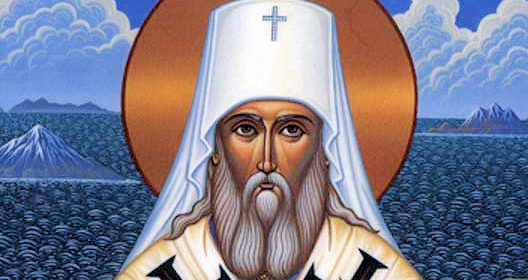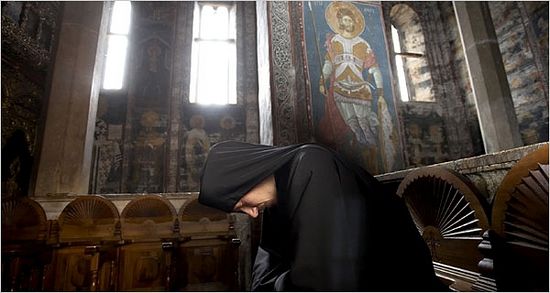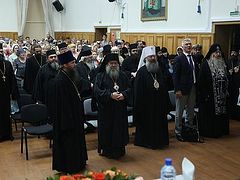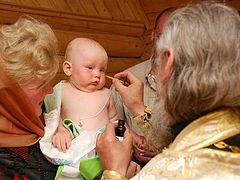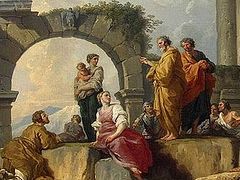Part 2: Man's Spiritual Nature
Several years ago Fr. Alexey Young (now Hieroschemamonk Ambrose) gave a parish retreat entitled “Orthodox Spirituality” which was turned into a six-part VHS series produced by Christian Activist Productions. Fr. Alexey was a spiritual child of Fr. Seraphim Rose, and, as these videos attest, acquired his talent for synthesizing the Patristic Tradition and communicating deep subjects in easy-to-understand language. As the videos are in a format that cannot be posted we will be posting articles, with Fr. Ambrose’s blessing, based on notes on the videos, throughout the Apostles' Fast in honor of the saints who have become masters of spirituality while yet in their earthly lives.
In this installment Fr. Alexey begins with the example of St. Innocent of Alaska, fitting for today's celebration of both All Saints of Russia and All Saints of America, both of which include St. Innocent.
One of our great missionaries of more recent times is St. Innocent of Alaska. His missionary years were very inspirational. He kept a journal in which you can read about many supernatural experiences, but most important was his missionary heart: he traveled five thousand miles a year to bring the Gospel to new peoples, he taught them various skills such as building organs to sell to Franciscan missionaries, and he devised an alphabet for the Alaskan Tlingits.
His Indication of the Way into the Kingdom of Heaven is a guidebook of basic Christianity, written for native tribes. We can read it and feel as if it was written for us, despite our “advanced” civilization. What was basic for them is advanced for us because of our low spiritual climate.
He writes of three things that we need to follow Christ:
- Deny yourself: We must root out the bad habits that keep us from God and bring down the wall of sin and passion that separates us from God. Especially we must not cherish our sins and passions. We often have one predominant passion and once we identify it we can stop cherishing it and replace it with virtue.
- Take up your cross: We must embrace our suffering, sorrow, and adversities. There are exterior crosses that come to us from outside, over which we have no control, such as a sudden accident, difficulty at work, etc.
Such exterior crosses by themselves are not enough, but we must have interior crosses—those which we choose to take up in conformity with the word of God. If we examine our consciences with our spiritual fathers then a thousand interior crosses will present themselves. These bring the true healing of our souls. If we bear our sufferings with submission to God, not seeking consolation in anyone but God, then He won’t abandon us or leave us without consolation. - Follow the Lord: In all things we must imitate Christ. Ninety percent of His words are about how to live, while ten percent are about doctrine, the Sacraments, life after death, and so on.
Man’s spiritual nature divided against itself at the Fall. The lowest part of our spiritual nature can be termed the “soul” (psyche), which is the seat of the passions, imagination, and emotions, which will not survive the death of the body. The passions create a wall that separates us from God, and most of us spend our time here, nurturing and growing the passions.
The higher part of our spiritual nature is termed the “spirit” (nous, mind, heart, “inner chamber”). When Christ says to enter into our closet and shut the door it means to enter into our heart, shut the door, and there commune with God. We tend to spend little or no time here, which is reached only by repentance. We must break down the passions and open the heart to God. Once the passions are stilled the spiritual state of inner stillness begins. There is a sense of stillness around the saints, which we know as hesychia, as especially practiced with the repetition of the Jesus Prayer.
The spirit or “mind” is the supernatural reason that the saints possess. Only the saints are truly rational, having attained that state through purification, according to St. Gregory of Sinai. St. Innocent tells us that to break down the wall of the passions we must work (praxis) with diligence and energy—so much diligence that it causes us a little discomfort, which is our voluntary sufferings—our martyrdom—our inner crosses. Further, St. Gregory of Sinai writes that no work, whether bodily or spiritual, that lacks pain ever produces fruit. The Kingdom is taken by violence, and by violence is intimated this painful bodily feeling in all of our efforts.
To continue growing requires watchfulness, or inner attentiveness (nepsis), which is necessary for replacing the vices with virtues. We must know what is happening inside ourselves. Most of us are in a state of inner sleep (hypnos). We think of ourselves as conscious, but the Fathers call it sleep—an unawareness characterized by self-centeredness. What we need is a detached awareness of what’s happening inside in order to be more aware of the promptings of the conscience.
One of these things happening within us is the movement of the imagination, which is one of the main obstacles to prayer and roots us in our fallenness. Spirituality must be based in actual contact with the living God, not with mere images which lead us to communion with our own ability to create religious scenarios. Even Satan can appear as an angel of light and enter into the realm of our imagination and passions.
Prayer requires an undistracted mind, and an imagination entirely suppressed, free of all images whether good or bad. The faces of the saints in their icons show dispassion and hesychia, which is the proper context for stilling our own emotions and passions and enclosing the mind in the words of prayer. Imagination is the chief aspect played upon by the demons, affected by suggestion. But by being watchful we learn to recognize suggestions from the Devil before they are entertained by the emotions.
To this end we have certain spiritual and bodily practices:
- Repentance: Metanoia—a change of mind or direction—is deep regret over our sins which makes for a lasting change in how we think, feel, and behave. It is a shift in the center of our being from the material to the spiritual. Real repentance leads to confession.
- Concentration: This is related to nepsis and the inward-turning of repentance when we look for signs of our relationship with Christ. The Lord said that the Kingdom comes not with observation, but rather it is within us (Lk. 17:20ff). That is, we come into contact with the living God in our spirit, or nous, or heart.
In his Beginning to Pray Met. Anthony Bloom writes that the words of prayer are our bow, and our fervor and single-mindedness to hit the target of the Kingdom within us is the arrow. There is something within us that is of God and it is to there that we must go. We must find this place. If you don’t find Christ in this life, you won’t find Him in the next, as they say. Christ exhorts us not to worry about food or clothes, and so on, because such cares scatter the mind and ruin our concentration. Rather, we must seek the Kingdom of God which is within us. - Prayer: St. Peter Damascene teaches that we ought to think of the name of God, that is, of Jesus, more often than we breathe. Concentration and prayer combine and center on the name of God. To this end we are also aided by the Sign of the Cross and prostrations, leading us to penetrate all things with prayer. It is truly that simple to acquire salvation.
Met. Hierotheos Vlachos writes that the greatest social act in all of history in all of mankind was accomplished by the Theotokos. She had no particular office in the Church but gave herself wholly over to the practice of silence, and thus she is Panagia—All-Holy.
She accomplished this even before becoming the Mother of God, and thus it is that she became the cause of the greatest happiness the world will ever know—the Incarnation of Christ. She is our perfect model of stillness, of hesychia, accomplished particularly during her time living in the Temple.
To come to God we must abandon the world of the senses, or rather, to rise above it. The Mother of God mortified her senses, perfectly obeyed Christ, and came to know Heaven while still in the body. We most properly honor her by imitating her.
In the Scriptures we read much on the conscience, particularly coming from St. Paul, and the Fathers quote him a good deal on this topic. Abba Dorotheos says that when God created man He gave him something Divine, warm, and luminous—that spark of reason to illumine the mind and distinguish good from evil—our conscience and natural law.
Adam and Eve’s conscience was darkened by sin and thus we needed the Law of Moses and the Prophets. The conscience can be clear or it can be defiled. It is clear when we do as we ought, bringing natural joy.
St. Paul tells us in 2 Cor. 1:12: For our rejoicing is this, the testimony of our conscience, that in simplicity and godly sincerity, not with fleshly wisdom, but by the grace of God, we have had our conversation in the world, and more abundantly to you-ward. That is, the sign of a clear conscience is joy. When we behave rightly the conscience is quiet, but when we act wrongly it accuses us. The saint is he whose conscience doesn’t accuse him.
The conscience is even sometimes referred to as “the accuser.” The Lord says to Agree with your accuser quickly, while you are in the way with him—while you are yet in the world—lest at any time the accuser deliver you over to the judge (Mt. 5:25). St. John Chrysostom tells us that he who is stung by the conscience has tasted of hell, whereas a clear conscience brings hope and joy. St. John of Kronstadt said that were we to live but one day in complete obedience to the commandments we would have a foretaste of Paradise—the Kingdom of God is within you.
Our world is restless and resists quietude, and we are brainwashed to cooperate with it. It encourages us to the enslavement of our senses by distractions and noise which feeds our imagination, emotions, and passions, rather than to enter the inner chamber of our hearts. We even dread being alone.
Met. Anthony Bloom advises that before starting a serious life of prayer we simply sit in a chair in the middle of the room with nothing in reach. Turn off the phone, turn off the TV, and so on—just sit there for half an hour and do not pray. Become aware of your intolerable boredom, for this boredom is with yourself, because you are so empty and can’t even entertain yourself for half an hour. Think how boring you are to God! The beginning of prayer is to realize this emptiness, that the highest part of our spiritual nature is void, and that everything is happening simply on the level of the soul—the seat of the passions and imagination.
The wall of the passions between us and God is where discursive reasoning functions, where we decide to indulge the passions or not. We can break down the wall of the passions and strengthen our will to serve God.
Question: What was man’s spiritual nature like in the Garden?
Answer: We know what the pre-fallen state was like because of the saints. They show us that the spirit and soul are not to be separated, but to be one. The emotions and passions are dormant, or elevated to a higher level in service to God. This is healing. But the saints are elevated even higher than Adam and Eve because we have the benefit of the Incarnation.
Question: How do we know when God is revealing something to us?
Answer: Most of us need to simply live the life of the Church. It is rare that something beyond that is given. What the Church gives us all is already difficult enough. If you think that God has sent you something you should deny it. If it’s from God you won’t lose your soul by denying it, but if it’s from Satan you might lose your soul by internalizing it. We must have a holy life to receive private revelations, for God doesn’t take up His abode in sinful vessels.
Question: How do we know if we have true repentance?
Answer: We know what the true fruits are: joy, and being able to turn from sin.

